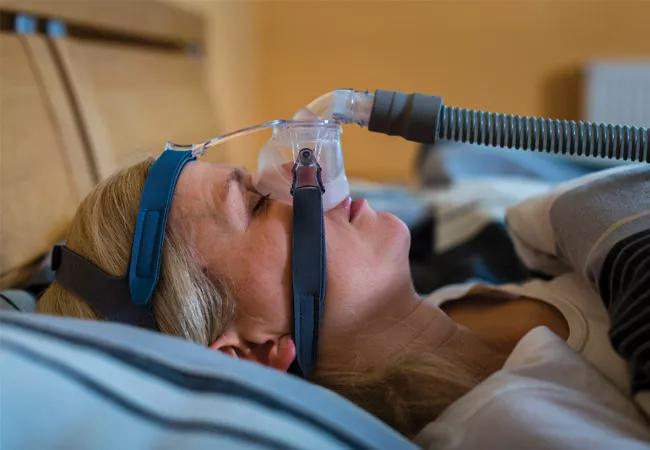An innovative approach to protecting patients during breast and lung radiation therapy

Image content: This image is available to view online.
View image online (https://assets.clevelandclinic.org/transform/8cb72462-eec5-48d0-b152-dd725d33df41/23-CNR-4044608-CQD-Hero-2-650x450-Dr-Shah-2_jpg)
23-CNR-4044608-CQD-Hero-2-650×450 Dr Shah 2
Researchers at Cleveland Clinic are testing a novel way to reduce the risk of lung and heart toxicities in patients receiving radiation for breast or lung cancer. The concept is based on using a continuous positive airway pressure (CPAP) device to reduce the dose to the heart and lungs in order to reduce these toxicities.
Advertisement
Cleveland Clinic is a non-profit academic medical center. Advertising on our site helps support our mission. We do not endorse non-Cleveland Clinic products or services. Policy
When radiation therapy is administered to the breast or chest, there is a concern about side effects to the heart and lungs (ex. pericarditis or pneumonitis). The dose to the heart and lungs can often be reduced if the patient complies with deep breath holds during treatment; however, not all patients are able to tolerate this approach, which lengthens treatment times while being very uncomfortable. This approach can be particularly challenging for older patients, as they have to hold their breath for 15-20 seconds multiple times during a treatment. Deep inspiratory breath hold can also require the use of costly, specialized equipment.
CPAP devices were designed to help patients with obstructive sleep apnea. However, using continuous pressure, these devices can be repurposed during radiation treatment to increase a patient’s lung volume, thereby reducing dose to nearby organs such as the heart and lungs. Cleveland Clinic Director of Breast Radiation Oncology Chirag Shah, MD, read about studies of this innovative technique underway at centers throughout the world.
“The physiologic properties of CPAP devices are well studied in terms of expansion of the lungs, so the idea is that when you use CPAP for breast cancer, the patient’s chest lifts up and this provides a greater distance between the area being radiated and nearby organs,” says Dr. Shah.
The research team aims to enroll approximately 90 patients in the study, with the primary objective being to assess changes in lung and heart doses on the affected side of the body when using CPAP as compared to free breathing and deep inspirational breath hold approaches. As part of the study, simulation CT scans are performed with CPAP and free breathing.
Advertisement
Before joining the study, patients are made aware of the potential benefits of using the CPAP approach, as well as potential side effects, which can include swallowing air, which can cause abdominal discomfort and in rare cases pneumothorax; mask discomfort; dry nose/nosebleed; dry mouth; headaches; claustrophobia; shortness of breath; dizziness and anxiety.
Eligible patients are those with left-sided breast cancers undergoing left breast/chest wall radiation (cohort 1) or patients undergoing lung stereotactic body radiation therapy for primary lung cancers or metastatic lung tumors (cohort 2). There is no upper age limit for the study but patients 18 years and younger, as well as those who can’t tolerate the CPAP device, are excluded.
Prior to initiating patient enrollment, respiratory therapists who specialize in utilizing and initiating CPAP treatments trained the radiation therapists on using the CPAP device. Under physician supervision, patients are also trained by the radiation therapy team, with a session to determine the maximum tolerable airway pressure (between 5-15 cm H20). “We’ve been blessed to have colleagues in the Respiratory Institute who have guided us,” says Dr. Shah.
The study launched in July 2022. The research team has been pleased that early results have shown that this approach appears safe, feasible, reproducible and well tolerated by patients. “Using a CPAP instead of a deep inspiratory breath device is easier for patients and can lower the costs of treatment,” says Dr. Shah. “We’re seeing very good lung sparing, which is consistent with some of the early data from previous studies.”
Advertisement
The Cleveland Clinic team continues to enroll patients. “Once we have validated comparable heart and lung doses between CPAP and the standard approach, I think that this could elicit change in clinical practice. This approach has the potential to be widely reproduced throughout the country with a minimal increase in the resources required. We still have a ways to go before reporting out study results, but it’s been promising thus far.”
Advertisement
Advertisement
A review of conservative, pressure-based and surgical treatments for OSA
Phase 1 study demonstrates immune response in three quarters of patients with triple-negative breast cancer
An update on the technology from the busiest Gamma Knife center in the Americas
Reconsidering axillary lymph node dissection as well as depth of surgical margins
Treatment assigned FDA review date in June 2025
Cleveland Clinic, the University of Minnesota and University of Cambridge receive $1M grant to develop point-of-care biosensor for early detection and treatment personalization
Staged pivotal noninferiority study is comparing BrioVAD with HeartMate 3
Ultra-Hypofractionated Whole Breast Irradiation and Partial Breast Irradiation Reduce Many Toxicities